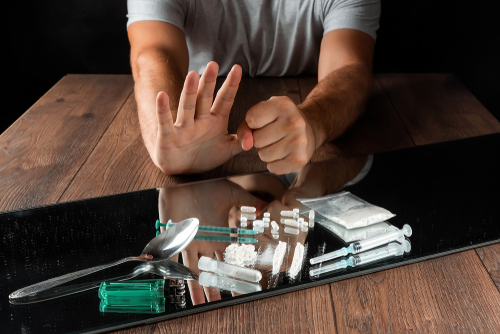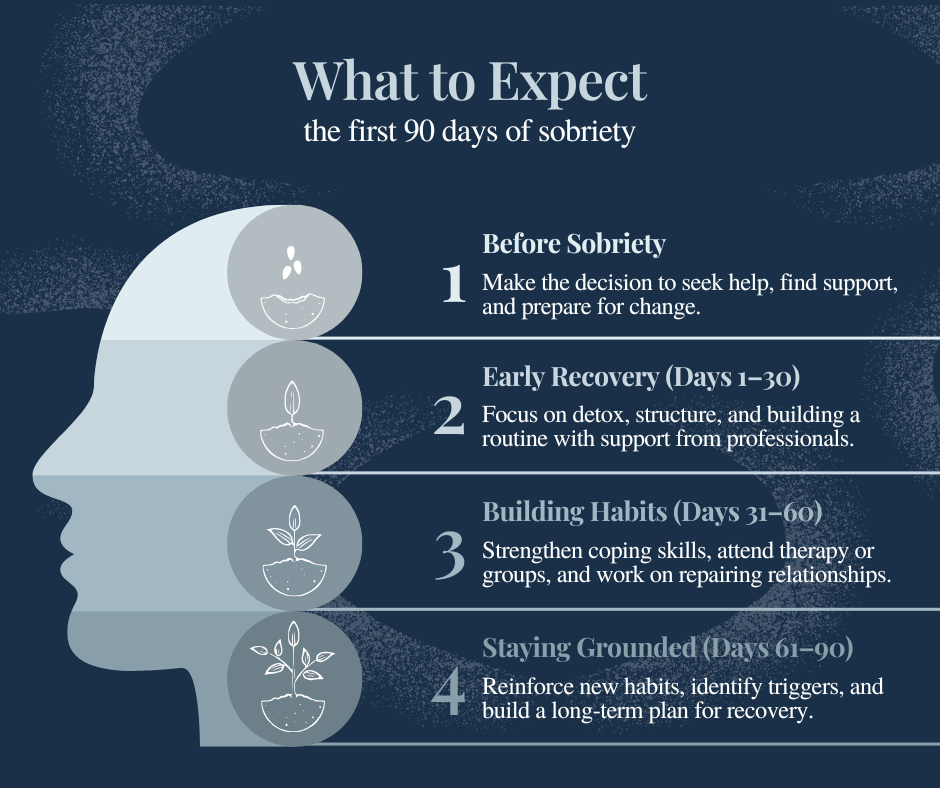If you want to know what to expect during and after your first 90 days of being sober, this is the article for you. The early days of sobriety can be filled with mental challenges, cravings, and physical changes, so we wrote this brief overview of what happens during the first 90 days, broken down into 30, 60, and 90-day milestones.
Once you finish this blog, you’ll have everything you need to start or continue working through your first 90 days of sobriety.
The first 90 days of sobriety come with ups and downs, and it can be beneficial to have support during this time. East Coast Recovery Center is an addiction treatment center offering a range of outpatient treatment options. Our programs can help you establish a strong foundation for lasting sobriety.
Is 90 Days Sober A Milestone?
The first 90 days sober is a milestone because this is when you’ll experience initial drug or alcohol withdrawal symptoms, as well as the strongest cravings and risk for relapse. During this time, you’ll need to find ways to overcome things that make you want to drink or use drugs and learn how to handle your new life without them. This may sound impossible, but experts suggest looking at it like this.
- The first 30 days are focused on breaking a drug or alcohol addiction
- The next 30 days are focused on identifying new and healthy coping skills.
- The last 30 days of the 90-day goal are for reinforcing and locking in these new habits.

Take Our Addiction Quiz For Recovery Insights
How To Get Through The First 90 Days Of Being Sober
Here are four suggestions that can help you through the first 90 days of being sober.
- Establish a daily schedule: A structured routine is crucial during the early stages of recovery. Creating a daily schedule helps you make the most of your time, promotes recovery, and reduces relapse chances. Plan your meals, sleep, exercise, social activities, work, and moments for self-reflection to prioritize what matters most in your recovery. Don’t be afraid to add addiction recovery meetings into your schedule, including narcotics and alcoholics anonymous.
- Set goals: Alongside the overarching goal of achieving and maintaining sobriety, setting smaller milestones can keep you motivated and uplifted. Recovery is a lifelong journey, and acknowledging your achievements along the way provides perspective. Celebrate your successes and reward yourself for the progress you make.
- Embrace your new lifestyle: Recovery goes beyond abstaining from substance abuse. Drugs and alcohol can have lasting physical, mental, and emotional effects. Committing to a healthy lifestyle helps reverse some of the damage caused by substance abuse and enables you to discover new coping strategies. Incorporate exercise, maintain a balanced diet, prioritize sufficient sleep, and use therapy to strengthen your recovery.
- Prepare for challenges: While it’s important to maintain a positive and hopeful mindset, it’s equally important to be prepared for potential setbacks. While not anticipating a relapse, it’s essential to acknowledge that it can happen. In many cases, it takes multiple attempts to maintain sobriety. Identifying triggers and potential temptations allows you to plan how to handle such situations, reducing the risk of being caught off guard.

The First 30 Days Of Sobriety
The first 30 days of sobriety are when you’ll experience the most changes and feelings. This early recovery period usually starts with a two to three-week detox program where individuals can safely overcome the initial withdrawal symptoms of alcohol or drugs. Everyone responds to the detox process differently, with some individuals still feeling the lingering effects of substance abuse.
However, the first 30 days aren’t just for detox. If you attend an addiction treatment program, you’ll be introduced to evidence-based therapy methods and medication like buprenorphine, naloxone, or methadone, which can help you process the early days of staying sober. This is important because you’ll begin to notice physical and habit changes, like sleeping more, not getting enough sleep, and dreams or nightmares about relapsing. You might also feel emotional fluctuations, like guilt, shame, or fear. But these moments can also include happiness, commitment, and hope for the future.
Read more: What Is Emotional Sobriety & How Can You Practice It?
Are You Covered For Treatment?
East Coast Recovery Center partners with numerous private insurance providers. Our team is committed to assisting you in quickly and effortlessly verifying your insurance coverage for treatment.
The Next 30 Days Of Sobriety
Between 30 and 60 days of sobriety, the focus shifts towards breaking down the negative habits contributing to your substance misuse. This phase involves learning healthier strategies to identify and manage triggers associated with your addictive behavior. The next 30 days are filled with therapy sessions, establishing a structured routine, and relishing in the joys of newfound sobriety. It’s a time to experience the benefits of clear thinking, socializing, and reconnecting with your authentic self.
30 days sober is also around when you start noticing positive mental and physical health changes. Your body can start healing from alcohol or drug use, and you might notice you get better sleep, feel less anxious during the day, and look forward to a sober life. You may also notice withdrawal symptoms such as strong urges, cravings, and persistent thoughts about drinking alcohol or using drugs start to diminish and become more manageable.

90 Days Sober & Beyond
After 90 days, you should have developed helpful ways to deal with challenges and learned to recognize things that might trigger your addictive behavior. By now, staying sober should be a regular part of your daily life. Attending meetings and seeing a therapist are important activities during this time. As you continue your journey, you’ll have more free time to explore new hobbies and activities that make you happy. You’ll also notice that you’re less worried about relapse and can focus more on enjoying your life in recovery. 90 days sober is also when you start to notice significant physical and mental health changes. These include:
- Improved vision: Many people initially experience blurry or hazy vision at the start of recovery, but by the 90-day mark, your eyesight should become much clearer.
- Better digestion and appetite: In the early stages of recovery, issues like heartburn, indigestion, diarrhea, and digestive problems are common. However, by 90 days, your stomach will have regulated itself and developed healthy bacteria, reducing digestive discomfort and improving your mood. It’s worth noting that a healthy gut can positively impact your mental health too.
- Enhanced sleep quality: Establishing a healthy sleep schedule during early recovery can be challenging due to withdrawal symptoms and dreams about substance use. These symptoms may disrupt your sleep and make it less restful. However, by the 90-day milestone, your sleep patterns will start to regulate, and you may experience fewer dreams about using and diminished withdrawal symptoms, allowing for a more peaceful sleep.
- Increased energy levels: With improved sleep and overall mental and physical health, you’ll likely notice a boost in your energy levels. While early recovery can be draining, reaching the 90-day mark often coincides with increased comfort and confidence in your sobriety. This shift enables you to redirect your energy towards various aspects of your life beyond solely focusing on avoiding relapse.

Maintaining Years Of Sobriety With East Coast Recovery
If you, a family member, or a loved one is struggling to quit drinking or get sober, contact East Coast Recovery Center. Our addiction treatment program can help you process and work through the challenges faced during the first 90 days of recovery. We offer various treatment options, including day treatment programs, partial day programs, and medication-assisted treatment. Call today, and one of our admissions agents can help you find a program that matches your needs and goals.
Connect With Us Now
Reach out to East Coast Recovery now for immediate support, or let us know the best time to contact you through our confidential callback service. Your journey to healing is just a conversation away.










